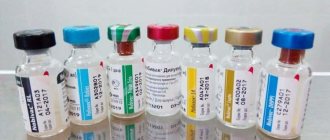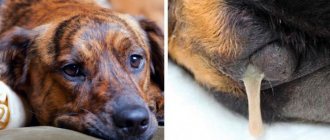Why is vaccination necessary?
A vaccine helps a dog develop immunity to a specific infection.
It contains fragments of an infectious agent, which, when entering a living organism, causes a corresponding reaction in the form of the production of antibodies. Subsequently, if the pet encounters a similar invasion of infection, it will not get sick or the disease will be mild. Dangerous diseases of dogs for which mandatory vaccination is carried out:
- rabies;
- plague;
- enteritis (parvovirus, coronavirus);
- adenoviral infections;
- leptospirosis;
- infectious hepatitis;
- parainfluenza;
- parvovirus
There are also vaccines against lichen, trichophytosis, and microsporia.
Types of vaccines for dogs
Nobivak preparations for dogs help prevent the development of the most common viruses
Based on the active component, dog vaccines are divided into attenuated and inactivated. The former are pathogens capable of reproducing. However, due to their weakening, they cannot cause the disease itself, but only stimulate the production of antibodies. The inactivated version is represented by dead microbes. Such vaccinations have a slow and short-term effect, so they need to be repeated.
In addition, there are mono- and multivalent vaccines. In the first case, the composition includes antigens of only one infectious agent. Examples of such vaccines are: Biovac-D, Multikan-1, EPM, Primodog, Kanivac-SN, Rabizin. Several infections are included in the composition of polyvalent drugs. These include: Multikan-4 (6.8), Nobivak, Hexakanivac, Vanguard-7 and others. Multi-strain drugs, as a rule, are not given to puppies, as they put too much strain on the immune system.
Vaccines can be of domestic or foreign origin. Among the Russian drugs that have proven themselves well are: Hexakanivac, Multikan, Vakderm, Polivac. Among the “foreigners” the following stand out: Nobivak, Eurikan, Vanguard, Hexadog. Each drug has its own characteristics and administration regimens.
Most often, vaccines are given subcutaneously (at the withers)
Vaccination of adult dogs
Vaccination of an adult dog
Dogs over one year old are required to receive annual vaccinations: injections are given once at regular intervals. It is allowed to vaccinate four-legged friends against infectious diseases once every 2 or 3 years, but the rabies vaccination must be given strictly after 12 months.
If the dog is elderly or elderly, then the decision about whether to give injections or not is made based on its health condition. The vaccine can provoke an exacerbation of the pet’s chronic diseases and further weaken the immune system. Again, a rabies vaccination should be given in any case. According to current legislation, the owner cannot refuse it.
Contraindications to vaccination during estrus
Vaccination is prohibited if during estrus the female exhibits:
- complete lack of appetite;
- excessive apathy or, conversely, nervousness;
- increased body temperature;
- purulent discharge from the vulva.
These signs may indicate serious pathologies of the urinary system, which must be urgently treated, and only then proceed with vaccination.
Very important! You should not vaccinate a female during estrus if she ran away from home during this period, following her sexual instincts. While on the street, the dog could become infected with an infectious or invasive disease, the signs of which had not yet appeared at the time of return. Introducing a vaccine at this point can provoke illness and cause serious complications.
How to vaccinate correctly
In order for the vaccination procedure to have only a positive effect on the dog’s body and not lead to complications, you need to adhere to some rules.
- The dog must be completely healthy. Even the slightest malaise, lack of appetite, fatigue and other conditions are reasons for postponing the injection.
- Before vaccination, your pet must be dewormed. Anti-worm medication must be given 14 days before the procedure.
- It is not advisable to vaccinate dogs while they are changing their teeth. A number of drugs have the ability to change the color of tooth enamel.
- Vaccinations are not recommended for puppies under 8 weeks of age. Early administration of the vaccine will weaken the immunity acquired from breast milk. And since they don’t yet have their own, the puppies may be completely defenseless against infectious diseases.
- In addition to deworming, the dog must be treated for external insects. The treatment is carried out the same way two weeks before vaccination.
- Most vaccines have a negative effect on the development of the fetus, so if dogs are to be mated, the vaccine should not be given. At least 12 weeks must pass between vaccination and mating.
- It is best to vaccinate on an empty stomach.
- If your dog is prone to allergic reactions, you can first give it an antihistamine. Which one it is better to consult a doctor.
We should not forget that after vaccination, the pet may develop anaphylactic shock, so for the first few minutes you need to stay close to the veterinary clinic.
Where do dogs get injections for major viruses?
When is vaccination necessary?
Vaccination must be carried out, but in the event that:
- The animal is clinically healthy . Whatever the norm, estrus is stress for the whole body. You yourself can observe that the dog is worried, its habits and appetite change, it can be both affectionate and aggressive, playful and calm or completely apathetic, it all depends on the properties and characteristics of the body;
- Preventive deworming was carried out . Helminths, releasing waste products into the body, thereby lead to suppression of the immune system. That is why it is extremely important to “drive away the worms” before vaccination.
Before vaccination, deworming should be carried out.
It is equally important to deworm before estrus, especially if you are preparing to breed and the puppies are highly desirable. Helminths that are transmitted in utero can cause serious harm to the offspring, including death.
Vaccination can occur either completely unnoticed by the body (without the manifestation of clinical signs), or with the manifestation of allergies and even anaphylactic shock. At the moment when the surge of hormones reaches its peak, it is completely unsafe to introduce foreign organisms into it.
The situation is out of control
It also happens that the planned vaccination is completed, and in the evening you discover signs of estrus in your dog. There is no point in worrying and running to the doctor; what's done is done.
Play with your dog with his favorite toy.
In this case, you can only help the animal. Show your dog more attention, pamper him with his favorite food and favorite toy. Try not to leave the animal for a long time; a bored animal is also prone to anxiety - and this is stress.
Exceptions
There are times when a quarantine is declared in an area, for example, due to rabies, your dog is not vaccinated, and estrus is in full swing. In this case, veterinarians who carry out general vaccinations are obliged to vaccinate 100% of the animals, and their opinion is clear - vaccinate, as the instructions say.
During the quarantine period, it is not advisable to walk your dog in unsafe places.
In this case, take responsibility yourself. It is illogical to follow instructions written by someone and risk the health of your pet. However, promise that as soon as the heat ends, you will take care of vaccination yourself and be sure to report this to the right authority.
During the quarantine period, try not to walk your dog in a disadvantaged area. Abstain for a while and it will give you no reason to worry.
The basis of dog health
If you care about the health of those around you, take responsibility and strict control on yourself. Do not leave to chance the processes occurring in the body of your four-legged friend.
Make it a rule to write down everything, even the little things. This will subsequently help you and the veterinary specialist, if necessary, in making a diagnosis and providing assistance.
By getting a passport for your animal, or simply writing everything down in a small notebook, you can easily remember both the date of vaccinations and the date of the last heat.
Once you have a notebook, make notes about your vaccinations.
Modern medicines and vaccines, including those, are equipped with self-adhesive labels that can be stuck on a passport or simply on a notepad. At the same time, you will no longer need to write down the complex names of vaccines, but you will still have to put the date next to the label.
Even if the dog has a passport and the doctor makes the notes, control the correctness and accuracy. The human factor has not been canceled, and mistakes can cost you and your four-legged dear.
Features of rabies vaccination
Although the overall situation with rabies in Russia is favorable, the possibility of an outbreak of this dangerous disease remains. Russian legislation obliges every owner of a four-legged friend to vaccinate him once a year. If the dog owner refuses to vaccinate his pet, he will face administrative punishment.
The law also provides for free rabies vaccination. Such vaccinations are not included in the cost of services even in private clinics. To get an injection, you can go to a state veterinary hospital. Often, primary comprehensive vaccination against infectious diseases in a state hospital is paid for, and further actions according to the scheme will be free. Moreover, if you get a rabies vaccination in such an institution, then the accompanying events will also be carried out free of charge. Among them: examination of the animal, anthelmintic therapy, registration of a dog passport, installation of a chip.
How much does vaccination cost?
Prices for preventive vaccinations for dogs vary depending on many factors:
- features of the vaccine (manufacturer, composition);
- vaccination location (home or clinic);
- pricing policy of the veterinary institution (budget, average, premium, luxury).
For example, giving an injection at home will cost 500 rubles more than if you bring your pet to the clinic. It will be more expensive to vaccinate a dog with an imported complex vaccine than a domestically produced one. On average, the cost of a comprehensive vaccination is about 1,500 rubles.
Don't forget to vaccinate and your dog will be healthy!
conclusions
If you experience symptoms that you do not understand, consult a specialist.
Observe your dog carefully, both during the period of heat and during the period of calm. The slightest deviations from the norm will allow you to quickly navigate and make the right decision. You cannot leave incomprehensible symptoms to chance; consult a doctor, and he will dispel your doubts or simply explain what is happening.
When planning your dog's pregnancy, take care in advance of all vaccinations and deworming, then nothing will overshadow the pleasant moments of the birth of healthy and full-fledged puppies.
Where is the best place to vaccinate?
Many owners try to vaccinate their pet at home. On the one hand, the dog feels more confident, which has a positive effect on its health and ability to tolerate vaccination. However, there is a danger that the animal’s condition may sharply worsen, for example, due to an allergic reaction, anaphylactic shock, and then emergency veterinary care will be required.
It is best to bring your pet to the clinic, undergo a preliminary examination, get a vaccine and wait a while. You can walk around the clinic or sit in the car. After making sure that everything is in order with the body’s response, you can go home.
Any owner wants to see their pet healthy and cheerful. The key to such a dog’s condition is timely vaccination.
Is it possible to vaccinate a dog in heat?
Reading time: : 4 minutes
Is it possible to vaccinate a dog when it is in heat? – This question arises if the dog has already reached a certain reproductive age and is in heat, and just during this period it is necessary to carry out the next vaccination. Also, such a question may arise in the spring and summer, when piroplasmosis can lie in wait for an animal almost everywhere and estrus is just around the corner with its first manifestations.
Possibility of vaccination during estrus
Vaccination during estrus is a rather ambiguous issue that gathers both positive and negative aspects. Thus, it is necessary to consider the most striking pros and cons of this rather important issue.
Pros of vaccinations during estrus
Among supporters of vaccinations during the period of estrus, the following opinions stand out, which indicate that there is nothing wrong with carrying out immunization in accordance with the vaccination calendar:
- Estrus is a completely normal physiological process in the life of every dog. Therefore, there is nothing wrong with this, you just need to make sure that the dog is completely healthy and get the most common injection from the veterinarian. During this period, many animals tolerate vaccinations very well without any negative effects on the pet’s body.
- Estrus is not a contraindication for immunization. This is even indicated in the instructions for many vaccinations, therefore, the owner has absolutely nothing to fear.
- In the event that the pet is not in heat for the first time, then vaccinations can be safely carried out, but it is advisable that a vaccine be used that has been used previously. This is due to the fact that its tolerance has already been tested and no consequences for the animal’s body can be expected.
“Against” immunization during estrus
Vaccinations during estrus are strictly contraindicated in the following cases:
- in the event that the animal’s body is already pregnant. This can have a very bad effect on the development of the embryo, so vaccination of an already pregnant dog is strictly contraindicated;
- lactation is also a strict contraindication;
- The pet’s immunity is significantly reduced after vaccination, therefore, if offspring are planned, it will not be very good, both for the mother and for the puppies.
When is it urgent to vaccinate your dog?
Sometimes there may be situations where vaccination is mandatory, regardless of what period in the dog’s life it is. Thus, it is worth paying attention to the following circumstances that require urgent vaccination even during the dog’s heat period:
- In the event that during the period of estrus the animal is completely healthy, despite changes in its mood. Estrus is not a contraindication here. You are the owner of a pet and you know exactly when and what symptoms may appear, and if you see that everything is fine with the dog, then you can safely take it for vaccination.
- If you have already completely expelled worms from your pet’s body. Here nothing can harm even during the period of heat, therefore, you should not be afraid to carry out the next immunization of the animal.
It is also very important to expel worms during the period before estrus. This is also necessary if you are going to get puppies. The health of the mother and offspring most directly depends on this process, since helminths significantly reduce the defenses of the dog’s body. Mating requires the mandatory complete cleansing of the pet’s body, both of one and the other sex.
Thus, regarding the advisability of vaccinations during the period of estrus, it is worth noting that everything depends on the characteristics of the dog’s body as a whole. Vaccination can go completely unnoticed or cause certain complications. These are most often allergic reactions or a significant increase in the pet’s body temperature.
Hormonal instability during the pet's puberty also significantly affects the dog's health, and when a vaccine is also administered during this period, it is a double blow for the pet.
Therefore, if vaccination can be delayed, then it is of course better to do so, but if vaccination is urgent, then it is necessary to rely on the protective forces of the dog’s body and on the strength of its immunity.
Only healthy animals can be vaccinated!
When heat appears unplanned
Sometimes you may encounter a situation where you vaccinated your dog in the morning, and by the evening there are signs of another physiological bleeding. Here there is absolutely no point in panicking and urgently going to the vet.
Here we can only advise you to treat your pet more carefully and affectionately. It is worth showing patience and love for him and trying to help cope with all hormonal surges. You can play with the dog and when the dog has completely calmed down, continue with his favorite treat or toy.
It is worth eliminating stressful situations as much as possible and giving the dog as much proper attention and care as possible.
Exceptions to the rules
Sometimes there are situations when some infectious disease is rampant in your region, and you have not been vaccinated.
At the same time, it is noted that the dog’s estrus is just at its highest peak.
Here it is worth noting that there can be absolutely no contraindications in this case for the next immunization. Vaccination must be done without fail!
However, it is worth noting that after such an urgent vaccination it is worth limiting walking in crowded places and bathing your pet.
You can, of course, not rush to get vaccinated and wait until the end of the heat, but in this case you need to weigh the pros and cons and clearly decide for yourself - can you be fully responsible for your actions in the event that your pet becomes infected with distemper or rabies?
However, if you still decide to postpone vaccination, then also limit walking and take care to minimize your pet’s contacts.
Basic principles to follow
In any case, the owner is responsible for the health of his pet. And if you are not indifferent to everything that can happen to your dog, then it is worth foreseeing all possible situations in advance.
If estrus is expected soon, then it is necessary to carry out all vaccinations before it starts, in order to maximally avoid negative consequences for the body of your pet.
If the dog has any illness or weakened immunity, it is necessary to consult a veterinarian and also delay the next vaccination for a certain period of time.
All vaccinations must be noted in the pet's health card or passport. It is imperative to ensure that the medical professional indicates the series of the vaccine, as well as its expiration date.











